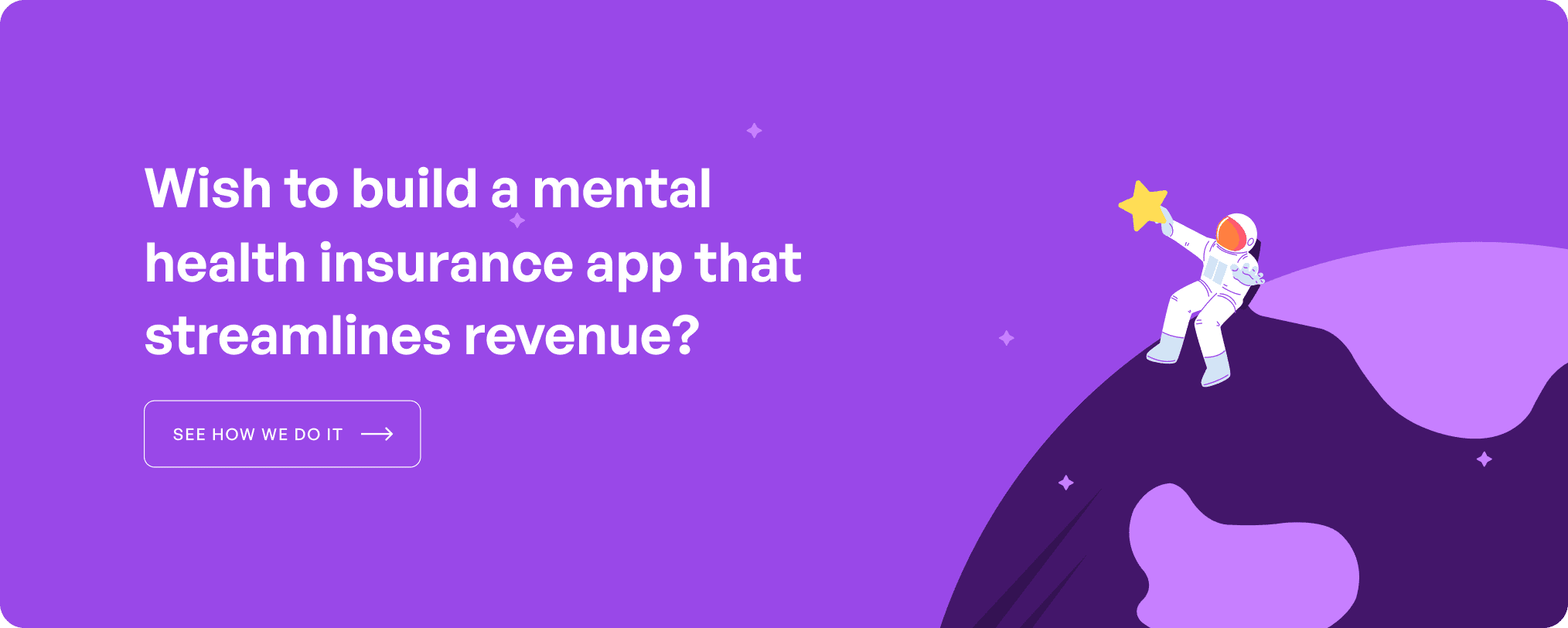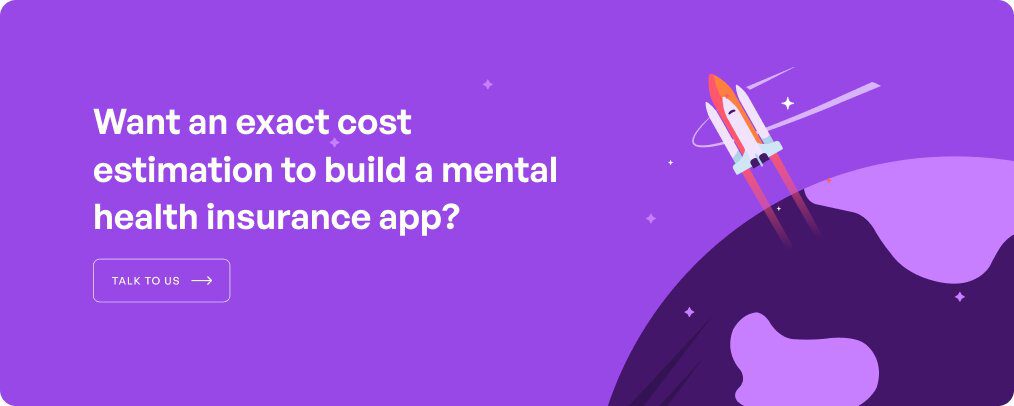Gone are those days when commercial health insurance companies delayed and disrupted necessary medical care for patients. The sector has undergone significant digital transformation after adopting technologies that streamline processes and enhance user experience. For example, there has been a steady upgrade in claims management, better fraud detections systems, and robust customer services with the help of generative AI. In short, this technology is excellent in terms of driving automation and minimizing risks and thus ensuring meaningful changes across the sector.
This has increased the confidence of users and thus the average spending per capita in this market is expected to reach $306.70 in 2024 alone. Further, online health insurance platforms are also able to offer personalized plans that meet individual demands along with offering virtual services for quick access which is further growing the market.
Overall, if you are an insurance company, this is truly a ripe opportunity to consider a mental health insurance platform to take your business to new heights. The approximate cost of the same would be between $20,000 and $150,000. Now, let’s see how to go about it.
Table of contents
Factors that impact the cost to build a mental health insurance platform
There are several factors which influence both cost and effort that businesses invest in developing an app. Knowing them beforehand can help you adjust certain areas of the project and make smarter choices. Find out below:
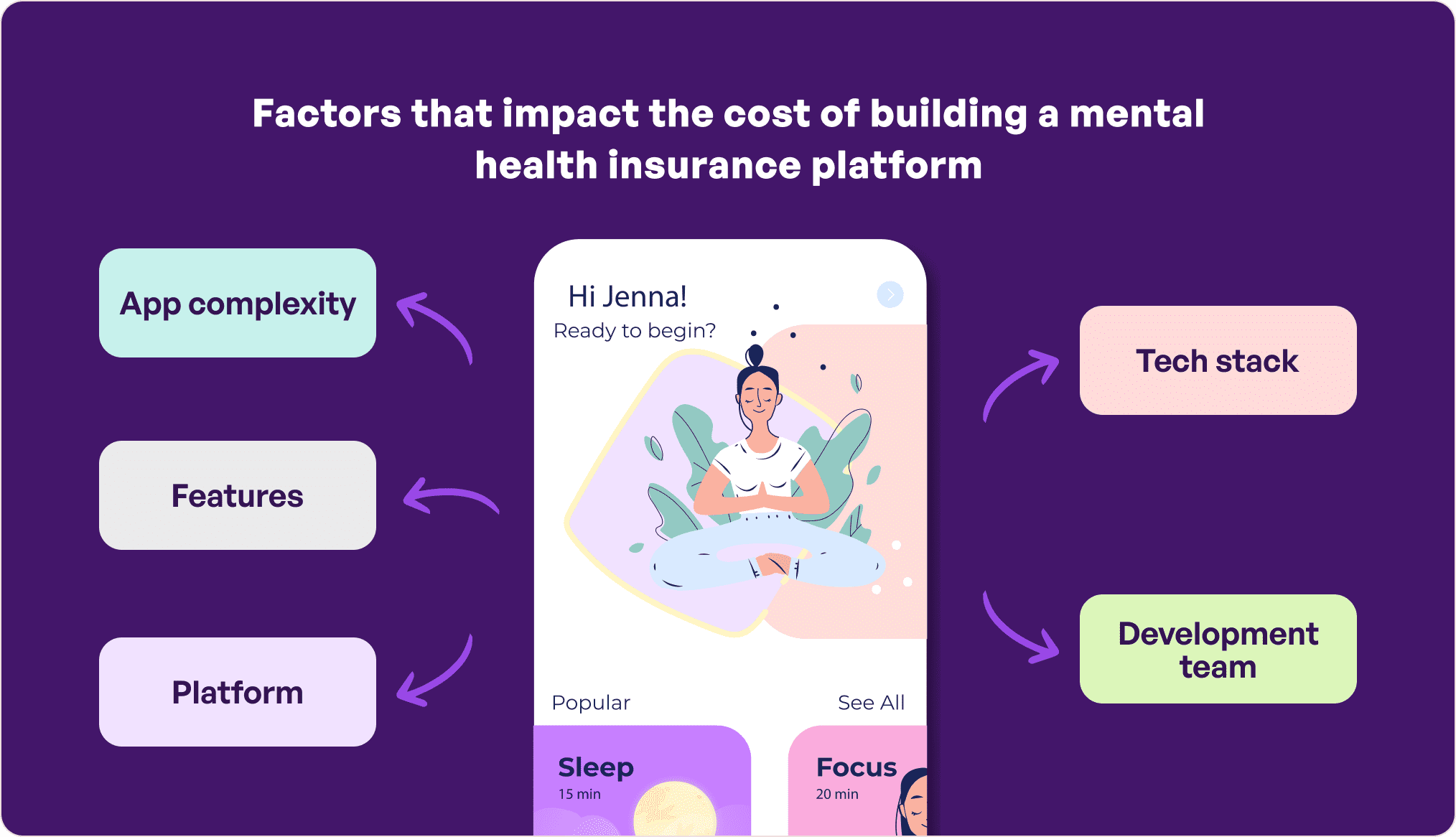
App complexity
Insurance platforms are typically complex with plenty of features, UI/UX design, health plans, payment options, customer service, and technicalities like data analytics and chat bots . Further, integrating AI or blockchain can noticeably increase the expenses. On the other hand, a simple app can bring down the mental health insurance platform costs.
Features
Insurance platform features impact the overall costs depending on their quantity and complexity. A feature-intensive platform with detailed backend support would naturally be more expensive than the one with a few simple functionalities. For instance, integrating telehealth features can cost you between $5,000 and $50,000+ along with its maintenance charges amounting to approximately $1,000 to $3,000 per year. Additionally, the time and resources required are also higher in apps with extensive features.
Platform
Whether you pick Android, iOS, or cross-platform, the choice will determine the final expense. This is because, native apps cost higher than hybrid ones since the latter is built with a single codebase and requires single maintenance effort. However, Android and iOS have their set of unique requirements which developers must adhere to which can increase the cost to build health insurance platforms.
Tech stack
The frameworks, tools, and languages used in the app and during the development process has an effect on app development budget. For instance, you will need machine learning engineers, data scientists, and software developers if you want to integrate AI algorithms into an app which will cost you an estimated $30,000 to $150,000. Further, adding product-based personalized recommender systems, which is typically necessary for insurance platforms, using AI and ML can cost between $10,000 to $25,000.
Development team
The location and expertise of the developers’ team must be considered when calculating the cost to build a health insurance platform. For instance, we at Simublade are a top healthcare app development company and charge between $25 to $50 for experienced professionals and $9 onwards for less experienced professionals who work on simpler projects. So, it is a good idea to schedule a call before you hire developers.
Features of a mental health insurance platform and their costs
There are a few essential features of a health insurance app that come with unique expenses that business must know beforehand. Here’s a look:
- In-app payment integration – $20,000 to $100,000 for pre-built payment solutions.
- Custom payment solutions – $ $100,000 to $300,000
- Telehealth facilities – $100,000 to $250,000 for comprehensive telehealth facilities.
- Geolocation – $45,000 to $60,000
- Third party API integration – $50,000 to $150,000
- Voice search – $300 to $900 per optimized page.
- AI integration – $6,000 to $500,000 depending on the tools.
To top it all, consider the costs of robust cybersecurity measures like multi-factor authentication, endpoint detection and responses, vulnerability management, and cloud migration, and real-time monitoring of at-risk elements. This expense will depend on the integration method and security solutions.
Legal compliance cost of a mental health insurance platform
The best mental health platform development services create a wealth of opportunities for businesses while reducing the overall expenses and the chances of unfair practices. Yet it is a good idea to be careful of data security since confidentiality is a key concern to avoid data leaks causing customers’ privacy breaches.
This is especially true for insurance companies using recent technologies like GenAI that come with the risks of system loophole exploitation, unauthorized data access, malware attacks, and creating highly sophisticated yet fake content. Besides impacting the business reputation, recovering from these disasters involve big finances.
So, do comply with insurance app security requirements laid down by GDPR and HIPAA regulations. Further, your health platform should also abide by the EU AI Act in case your business is serving patients in the European Union.
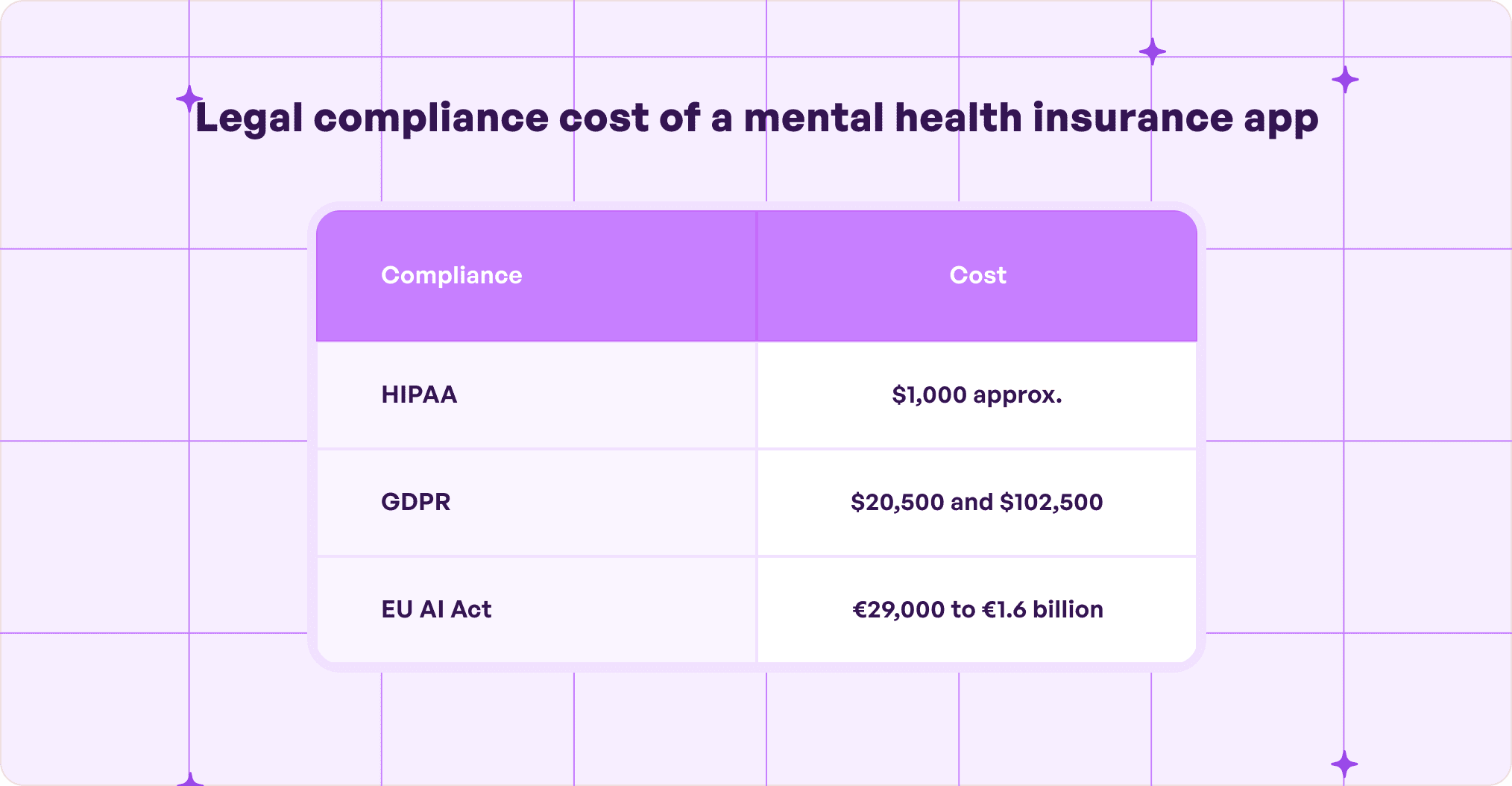
The cost to implement HIPAA would approximately be $80 for updated Notice of Privacy Practices, $763 for breach notification requests, $84 for business associate agreement updates, and $113 to comply with security rules.
The total GDPR compliance cost would be between $20,500 and $102,500.
The compliance cost of EU AI Act would be estimated €29,000 to €1.6 billion annually depending on the risk of the AI system implemented.
The above expenses will depend on organization type, size, and environment like kind of firewalls and backend server models.
Cloud-based or on-premise platforms : which is cost-friendly?
A comparison of cloud-based vs on-premise health insurance platforms is a must to understand which one fits both your budget and requirements the best. A cloud-based software is typically less-expensive than an on-premise infrastructure because cloud platforms have low initial costs. Further, cloud solutions are web-based and do not need on-premise data storage hardware.
The cost of a fully-hosted network will cost between $100 to $200 per month and the cost of a cloud server will cost $5 per month. On the other hand, you can expect to pay up to $2,000 per month for on-premise infrastructure.
Therefore, consider cloud consultation services from experts who will help you explore the full potential of this technology. For instance, hosting mobile and web applications on cloud with the primary agenda of creating superior experiences around scalability, interoperability, and security of the mental health insurance app.
Development costs of a mental health insurance platform
There is no specific cost to build an app. However, below is an estimate of the expenses you can expect at different stages of the development. Find out.
Phase 1: Discovery & Scoping – $5,000 to $25,000
A discovery workshop session is conducted where professionals will brainstorm ideas and check technical viability and market acceptance. This helps with 50% faster project delivery due to structural clarity, technical assessment, and project estimations. Further, this phase also helps in creating a product roadmap to ensure transparency in the process.
Phase 2: Product Design – $3,000 to $30,000
Android and iOS UI/UX designers prioritize crafting intuitive apps that encourage users to engage seamlessly aligning their needs with your business goals. This is done by researching the target audience and then merging design capabilities and technical expertise for a solid brand identity.
Phase 3 : Engineering – $5,000 to $25,000
Our mobile app developers deeply understand the app space and are known for writing clean and secure code. Ultimately, the end result is a robust and scalable app that causes resonance among your target audience.
Phase 4: Testing and QA – $5,000 to $6,000
This is where the quality assurance service team will conduct unit testing, integrated testing, performance testing, load testing, usability testing, security testing, system testing, and functional testing. Altogether, this helps to ensure the application is aligned to your business goals and user needs.
Testing would typically cost 15 – 25% of the total project budget that you have set aside for mental health platform development cost. As per this industry norm, businesses should calculate and get an estimate of the expense.
Phase 5: Deployment and Launch
Apple Store charges $99/year and Google Play Store charges $25 one time fee. The app developers will meticulously follow the app submission protocols and maintain a seamless integration with legacy software.
Phase 6: Post-Launch Maintenance – $2,000 to $2,500
The average expense for this is around 15% – 20% of the initial mental health insurance app development budget.
What are the hidden costs of mental health insurance app?
Besides these straightforward expenses, there are a few hidden costs of app development that you must consider beforehand. Otherwise, non-visible expenses might cause a sudden financial burden. Here’s a look at what you must remember to check. These will depend on the type of app you wish to build.
- Administrative costs
- Infrastructure costs
- Third-party costs
- IT support costs
- Mid-project changes cost
Further, marketing, app security, and software license costs are additional expenses. It is a good idea to get in touch with us at Simublade to discuss the project estimations in our discovery workshop. We provide end-to-end cost clarity and transparency to help you make informed budget decisions before kickstarting the project.
Top ways to reduce the costs of developing a mental health insurance platform
When building a mental health insurance platform, it is a good idea to strive and lower the costs of app development which helps maintain budget limits. Along with this, we at Simublade make sure the quality of the application is not derailed in the process. Let’s see a few tips on how to lower app development expenses.
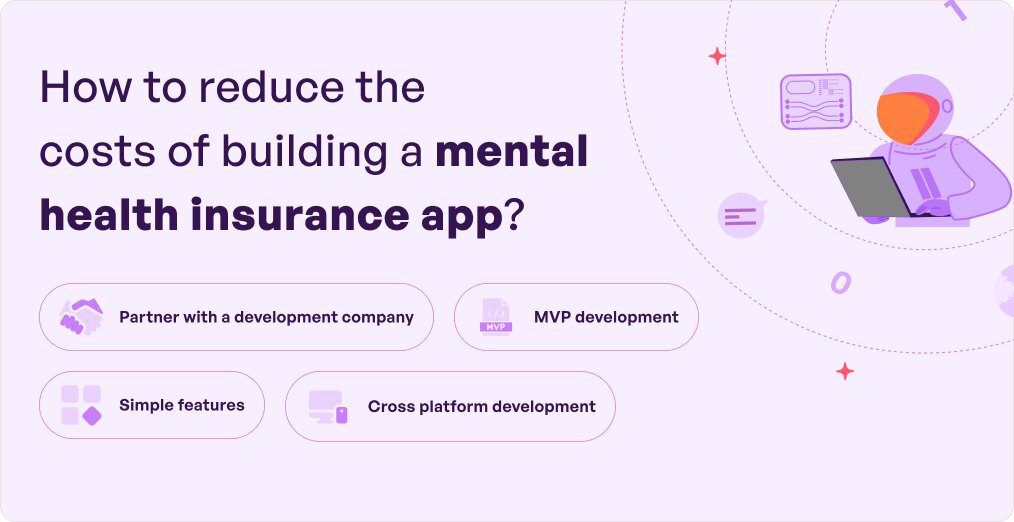
Partner with a development company
At Simublade, we are committed to build a mental health insurance platform that meets the needs of both clients and the medical sector. Businesses can enjoy our expertise in custom solutions for hourly charges between $25 – $50. Our team of highly committed professionals dive into core business goals and processes which helps build a truly valuable platform. In short, outsourcing reduces the risks of errors, streamlines the development process, and helps save your money and effort.
MVP development
An MVP development is an app’s simpler version that is released into the market to test its viability. This is more affordable since there are fewer risks before launching a feature-rich product due to clearer understanding of customer demands and less monetary investment. Businesses can consider MVP development services before a full-fledged health insurance app development where professionals identify key offerings, work on clickable prototypes and deliver the product within 12-weeks to get it validated in the real world via real users.
Simple features
Adding just the key mental health insurance software features like plan comparison and selection, healthcare provider integration, in-app insurance cards, premium calculator, coverage details, and claim management in your mental health insurance app can be helpful in reducing the expenses. You can try and avoid features like AI integration, telemedicine, digital health records, GPS-based hospital locator, reports and analytics, and multi-language options.
Cross-platform development
Cross platform app development allows significant budget and time savings since a unified code is used by a comparatively smaller team of developers to build apps for all operating systems. This is 15%-20% cheaper than building native apps with different technologies, frameworks, and programming languages. The good news is that despite not having an extensive development process due to reusing codes, cross platform apps are highly successful with user-friendly interfaces.
Conclusion
In a nutshell, the average cost to develop a mental health insurance platform will solely depend on its type and complexity. Businesses can consider easing the burden by checking the latest trends in the insurance sector and omitting outdated features like fingerprint scanning and integrating new and advanced ones like user data analytics. Further, collaborating with a team of developers who offer multiple hiring models like fixed-price time, time-based, or on-site model to suit your budget can make a difference.
FAQs
Q. What are the critical features to include in a health insurance app?
Ans. The essential features of a health insurance app includes plan comparison and selection, healthcare provider integration, in-app insurance cards, premium calculator, coverage details, and claim management.
Q. How much does it cost to implement telehealth features in a mental health insurance platform?
Ans. It costs approximately $100,000 to $250,000 for robust telehealth facilities.
Q. How does the development team’s location affect the cost of building a mental health insurance platform?
Ans. The cost to build health insurance platforms in the US would typically be higher than in Asia and Europe. For instance, in the US it can cost approximately $210,000, $50,000 in Asia, and $70,000 to $140,000 in Europe.
Q. How does compliance with HIPAA and other regulations impact the cost of building a health insurance app?
Ans. Complying with HIPAA regulations would cost roughly $1,000, GDPR would be roughly $20,000 to $102,500 and EUI AI Act would be roughly €29,000 to €1.6 billion.
Q. How do I choose the right development team for building a health insurance app?
Ans. Before choosing mental health platform development services or a team, consider reading their online reviews, checking their portfolio, and getting an idea of their skill sets and expertise. Then you can get into an initial consultation call for more details.
Q. What are the benefits of using a cloud-based infrastructure for a health insurance platform?
Ans. Cost wise, the top benefit is less expenses since users only pay for the resources they use which helps scaling your operations.



